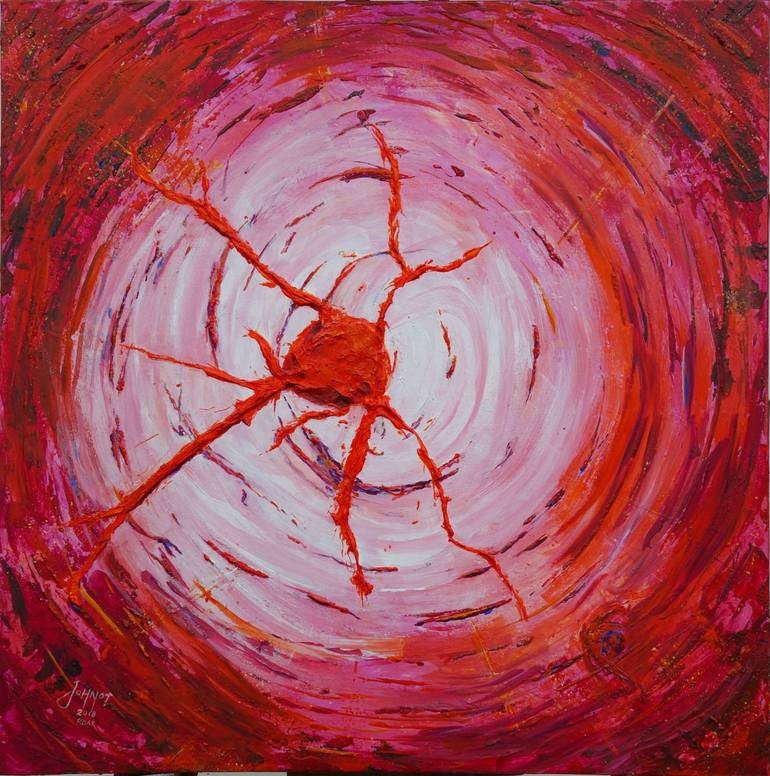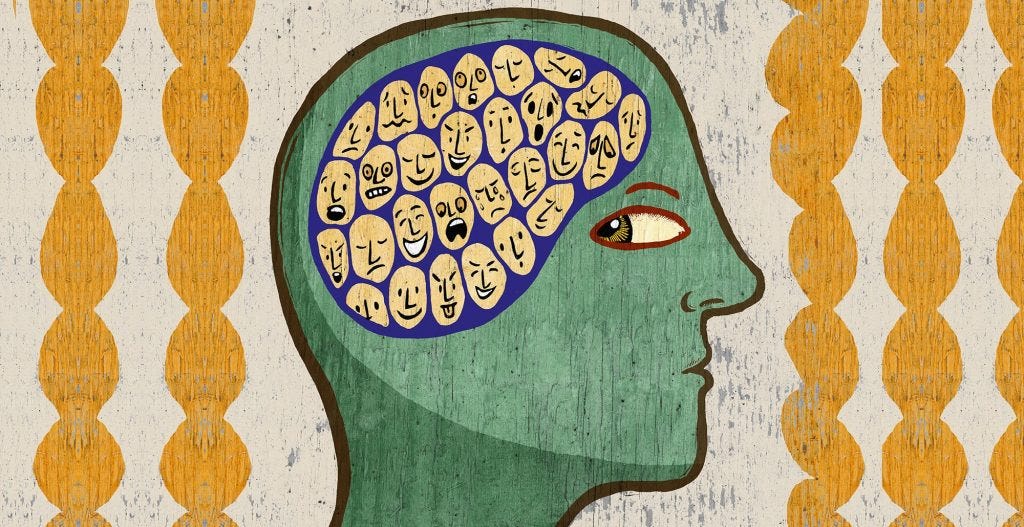Anger is the antidote to your neurotic traits. That is, when expressed in a healthy way or used to get what you want. Suppressing your anger, on the other hand, is one of the most destructive and dangerous psychological states to be in. It can cause harm to you and everyone around you.
It doesn’t take much to hide from ourselves; we need a believable excuse, a social narrative, and a habit that allows us to escape the present moment.
This is what I noticed happening a few years ago. There was a pattern that enabled me to push down what I unconsciously thought of as bad emotions, bad ideas, bad desires. The specifics don’t matter but anger was a trigger that caused the urge to stop being present and go inside the mind; intellectualization. Instead of dealing with what was in front of me, I tried to think the problem away, or somehow rationalize desires as “not worth it”, as illogical.
But there are no free lunches.
Emotions don’t just disappear, nor do they care about your intellectual ideas and ideals. They might be illogical but they reveal something fundamentally true about your psyche. So, what happens instead? They return to their source, waiting for further examination, acting as small tension generators. Their source? The body.
The Backwash
The body hosts the unconscious mind. It’s the autonomic nervous system, the brain, your sense-perception, everything that’s automated. Naturally, when we suppress what was about to reach the surface, it becomes unconscious again — it returns inside where it begins to fester.
Dr Sarno with his work on TMS (Tension Myositis Syndrome) made the hypothesis that this kind of suppression has a real, physical effect —namely, oxygen deprivation1.
He thought that back pain (almost all physical pain) was a defense mechanism of the body to divert your attention from an emotional issue. Likewise, the Reichian and Lowen tradition2 also claim that the body takes the burden of the unexamined emotional complexes, creating an armor around them that needs breaking down to release what’s trapped. Jung also talks about these kinds of “locks” that require a lot of energy to maintain, and unlocking them naturally releases the energy (libidinal).
From a TCM perspective, turbid Qi is stale information. Repressed emotions that block the circulation of energy, eventually resulting in stagnation, disease, and pain.
All this to say that there are many tricks your unconscious uses to protect you from experiencing negative (or even positive) emotions. The reason? My best guess is that it has something to do with old patterns that once served a purpose but now don’t. The Internal Family System points to the “parts of you” that protect from a hostile environment but in adulthood have no use. For example, you learned never to express your needs clearly because when you did as a kid, you were met with apathy or even abandonment.
You don’t feel safe to experience anger, or you believe your anger is a deficit, an error, a defunct part of your personality. So, you hide from it.
You can’t change your behavior by changing your behavior
You can’t stop being angry by… stopping being angry. There’s no button to press, no intellectual or philosophical argument that will suddenly make you go Aha! Be gone anger.
No, behaviors are driven by the unconscious. But even the idea that you should get rid of anger as if it’s an unnatural state points to what’s ugly about the way we view emotions. They’re something to be ashamed of, except for the most neutral or culturally positive ones. The face of neuroticism isn’t the wide-eyed, shivering anxious child but a deflated, grumpy, constricted adult.
Obviously, anger is a process, not a permanent state. A process that captures Will and redirects it to affect reality. Avoiding action, despite the urge to act (anger), is a little like holding in your pee; uncomfortable and bad for your prostate.
So, clearly I’m saying that if you feel like fucking shit up… you should.
Emotions aren’t steps of a ladder
Fucking shit up is never what you want though. Because it doesn’t get you what you want. As I’ve explained, there’s a deeper desire that the anger masks.
Herbert Marcuse argues that “Repressive Tolerance” allows for the co-optation and commodification of aggressive political ideas, rendering them products that can be absorbed by the system they sought to critique3.
On the level of the individual, anger is one such political idea. We often use “narrative antidotes” that suppress the emotions that challenge the structure and integrity of our own sense of self and worldview;
Traits and attitudes like gratitude, peace, openness, empathy are arbitrarily juxtaposed as the antithesis of aggression and assertiveness (byproducts of anger). In that sense, we learn to view anger in relationship to positive emotions, as if they exist on a spectrum of morality, the former placed at the farthest left.
This learned behavior is more prominent in spiritual bypassing; we use higher ideals to avoid facing unresolved emotional issues, trauma, or growth challenges. You shouldn’t be angry because good people aren’t angry. No, they’re… caring and sensitive and empathetic?? You must stop feeling angry (changing your behavior) and you should start feeling gratitude. Wonderful!
Yet, there’s no emotional ladder. There isn’t some gradual ascend to a place where everything is pure. That’s spirituality and we aren’t doing that now —we’re on planet Earth.
Emotions are how you interpret signals from reality, and as long as you consider yourself human then all of your decisions are motivated by them.
Skillful Action
So, what’s the solution? Well, for one there’s no “solution”. It’s not a problem to solve. There’s just acceptance.
First of all, you accept that you aren’t always aware of how you feel
Then, you must start noticing how you feel
When you can do that consistently, you stop rejecting how you feel and investigate why you feel that way
Finally, and that’s the big doozy, you take action in a way that fulfills a deeper desire
That means you should always behave like an animal, following your urges and instincts without second thought… wrong!
Part of untangling the mess of your inner world is realizing that what you think you want in the moment and what you actually want long-term are two different things. Maybe you want to punch that guy at the bar because he said mean things about you - that’s level 14.
Level 2 is realizing that the reason you were hurt and angry is because there was truth to what he said. If you allow me to become an armchair psychotherapist for now —aren’t all psychotherapists armchair? — the correct response is to NOT reject the anger, but fuel it in order to a) place boundaries that give you the strength to connect with him b) address what was true about you c) build your character in a way that the last two points become an automatic mechanism.
Addressing the Body
The above still leans heavily on the intellectual narrative. The story you tell yourself about yourself. I’m not an “ERADICATE THE MIND TO FIND LIBERATION” type of guy so I do strongly believe that it’s necessary to create a healthy pattern of recognizing and labeling emotions accurately. But obviously, it’s not enough nor is the endpoint.
Anger is particularly stubborn when it gets stored in the body. It can take years to untangle the thread it has weaved inside you. I’ve noticed that some adults have lost the ability to become angry! Isn’t that crazy? You can clearly see the diffusion happening and the tension increasing right in front of your eyes. Some just cry a lot when poked.
Getting inside the body, leaving the narrative and the story out, is the natural next step. You have to reacquaint with parts of you that have become dormant, hidden.
One tool that you can use is TRE (Trauma Release Exercise). Even if you don’t have trauma, you have somatic patterns that maintain certain emotional complexes. The neurogenic tremors can release and bring them to the light.
This is a useful introductory video. But if you’re serious about it, I recommend in-person sessions. Also, as I’ve mentioned already, look into the work of Lowen and Reich. Start with “Fear of Life”, “Betrayal of the Body”, and “Pleasure” by Lowen.
These are “breaking down” modalities so it goes without saying that you need to build up something in its place. There’s a subset of people who get into somatic therapy and you see them 10 years later still crying and purging, going from retreat to retreat. Remember that the ultimate goal is to stop needing external tools to be ok and enjoy yourself. Healing is part of life, but it’s not your entire life.
Stop trying to be cool
Becoming the cool guy is what’s considered an ideal archetype in our world. Cool and uncommitted, aloof, yet open. Rarely angry, always witty, never bothered.
While there’s obviously something attractive to that ideal, any and all archetypes are still “locks” that represent “shoulds” and “goodguyness”, acceptable roles in our society.
I bring up the concept of coolness specifically, though, because I believe it strikes at the core of our cultural expectations. We value cold traits - even our gender dynamics are based on “good vibes” and uncommitted interactions, i.e. nothing of essence. Intimacy and vulnerability are either performative or met with derision.
Chill out is the expression used to diffuse emotionally loaded situations. But chill-lessness persists and appears in our neurotic complexes.
“The neurotic individual is in conflict with himself. Part of his being is trying to overcome another part. His ego is trying to master his body; his rational mind, to control his feelings; his will, to overcome his fears and anxieties. Though this conflict is in large part unconscious, its effect is to deplete the person's energy and to destroy his peace of mind. Neurosis is internal conflict. The neurotic character takes many froms, but all of them involve a struggle in the individual between what he is and what he believes he should be. Every neurotic individual is caught in this struggle.'
The neurotic person struggles to win over himself. In this, of course, he must fail. Failure seems to mean submission to an acceptable fate, but actually it amounts to self-acceptance, which makes change possible. To the degree that most people in Western culture are struggling to be different, they are neurotic. And since this a fight one can not win, all who engage in this struggle will fail. Strangely, through the acceptance of failure, we become free from our neurosis.”
Anger is, once again, cast aside as an ugly, unattractive behavior because it’s a sign of failure in our current emotional symbology. Losing your temper isn’t what the cool guy does. The cool guy exists, he needs not to act. Whatever. Listen to the waves maaaaan. Good vibes. I can hear you through the screen saying that cool guy doesn’t sound bad.
Listen, I won’t tell you who you must become… but you must become yourself. That’s the coolest guy you’ll ever meet actually. And to do that, you’ll need to remove that armor of yours, no matter how shiny it is.
He proposed that the brain selectively induces mild tissue hypoxia through reduced blood flow. While I’m not entirely convinced by this specific mechanism, it's reasonable to suggest that a process involving the nervous system, cellular respiration, and local tissue hypoxia could be at play.
“Every chronic muscular tension in the body has associated with it sadness, fear, and anger. Since tension is a restriction of our being, it makes us sad. It also makes us angry to be so limited. And we are frightened to show our sadness or express our anger, so we stay locked in a diminished state of being and tied to our fate.”
― Alexander Lowen, Fear of Life: The Wisdom of Failure
I don’t agree with his solutions, however.
This might feel like backtracking. Like I’m saying that you aren’t allowing your anger to flow. But as you get more comfortable with anger, you’ll notice that it’ll mellow more and more until “anger” will now be an entirely different emotion, pointing to meaning and purpose, not senseless violence.










Idk why I reasonated with this part of your writing “Listen, I won’t tell you who you must become… but you must become yourself” but a lot of people are still trying to hard to become someone they’re not in this day & age. Overall, great article
Wise .